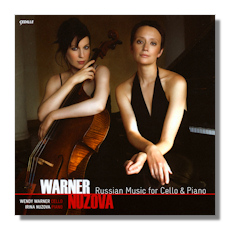
The Internet's Premier Classical Music Source
Related Links
-
Myaskovsky Reviews
Prokofieff Reviews
Rachmaninoff Reviews
Schnittke Reviews
Scriabin Reviews - Latest Reviews
- More Reviews
-
By Composer
-
Collections
DVD & Blu-ray
Books
Concert Reviews
Articles/Interviews
Software
Audio
Search Amazon
Recommended Links
Site News
 CD Review
CD Review
Russian Music for Cello & Piano

- Nikolai Myaskovsky: Sonata #2 in A minor, Op. 81
- Alexander Scriabin: Etude Op. 8, #11
- Alfred Schnittke: Musica Nostalgica
- Serge Prokofieff: Adagio from Ten Pieces from the Ballet Cinderella, Op. 97b
- Sergei Rachmaninoff: Sonata in G minor, Op. 19
Wendy Warner, cello
Irina Nuzova, piano
Cedille Records CDR90000120 68:55
Warner has dedicated this disc to her mentor Mstislav Rostropovich, with whom she studied at Curtis, with whom she performed internationally, and for whom she played at that great cellist's 70th birthday celebration in Moscow. She also was the first prize winner at the Fourth International Rostropovich Competition in Paris in 1990. Her playing certainly honors his memory.
Nuzova has also been a top prize winner in international competitions. A native of Moscow, she made her debut as soloist with the Omsk Philharmonic at the age of 14. She moved to the United States in the early 1990s. She studied at Juilliard, among other places, with Vladimir Feltsman among other pianists, and has a Doctorate of Musical Arts.
After successful individual careers, and sometimes playing together, Warner and Nuzova formed the WarnerNuzova Cello and Piano Duo in 2008, specializing in Russian and American music and with the intention of commissioning new music.
Russian Music for Cello and Piano is the first CD by this duo and it amply justifies their decision to form it. They appear to be of one mind about how to play these pieces; not only is there no tension between their respective contributions but they sound as if they had been playing together for a long time, as is the case with the very best chamber groups.
This CD offers very pleasurable listening from beginning to end. The Miaskovsky, one of the last works by this prolific symphonist, who died in 1950, is a lovely work in three movements. For Nuzova, it reflects the mood of a sad Russian symbolist poem which reminds her of her homeland. Its text is included, in Russian and English. Perhaps it is my lack of Russian soul, but I have not found the music particularly melancholy, even though it is in a minor key, though the middle movement, Andante cantabile, does reach impassioned intensity. The opening movement, Allegro moderato, might well also have been called cantabile, as it is songful and soaring, with beautiful, long legato lines for the cello and an appealing part for the piano. The finale is lively. Tempos seem just right, throughout.
The other major work, Rachmaninoff's 1901 Sonata in G minor, is much better known in the west than is the Miaskovsky, and there are many other recordings of it, but these artists simply went ahead and put their own imprint on it. The performance has clear articulation end expressive playing by both performers, throughout. I am not particularly a fan of Rachmaninoff, as I overdosed on his music when young, but the romanticism of this piece is not over the top. To my ears, the middle movements are most appealing. The Allegro scherzando has greatly varied tempos and dynamics and the cello part ranges from a skipping effect to short sharp attacks, which particularly reflect Rostropovich's legacy. In the Andante, Warner's broad legato playing with good firm tone, and Nuzova's subtle expression, are especially notable.
The other pieces on this disc are pretty much encore material. Piatagorsky's transcription of Scriabin's piano etude is successful. Schnittke, a composer of many styles, treats us here to a Bach-like opening and an utterly weird off-key slide which was surely intended, but I have no clue as to why. The Prokofiev is an exquisite waltz for Cinderella and the prince, from Act II of the ballet.
Highly recommended.
Copyright © 2010, R. James Tobin





















